|
|
|
Sort Order |
|
|
|
Items / Page
|
|
|
|
|
|
|
| Srl | Item |
| 1 |
ID:
136607
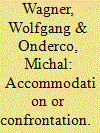

|
|
|
|
|
| Summary/Abstract |
Even though democracies by and large share the perception of Iran as a threat to peace and security, they disagree over the appropriate policy response. This paper examines why some democracies prefer accommodation while others plead for confrontation. Using a new data set on democracies' policies toward Iran in the 2000s, we assess the impact of power positions, commercial interests, and domestic political cultures while controlling for government ideology. While we find little support for any impact of power positions, “cultures of dealing with deviance,” that is, the discourses and practices of dealing with violations of norms domestically as institutionalized in a society's criminal law and justice system, have a substantial and statistically significant effect on state policies. Finally, we find qualified support for commercial liberalism: Whereas high levels of total trade do not have the expected effect of making states more accommodationist, high levels of trade in strategic goods such as oil do.
|
|
|
|
|
|
|
|
|
|
|
|
|
|
|
|
| 2 |
ID:
166861
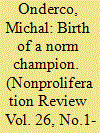

|
|
|
|
|
| Summary/Abstract |
In 1995, South Africa was in a special position. It was: a new party to the Treaty on the Non-Proliferation of Nuclear Weapons (NPT), the first country to voluntarily renounce nuclear weapons, led by a charismatic leader, and seen as a champion of disarmament principles. Yet South Africa’s new leaders were also interested in affirming their position within the Non-Aligned Movement, which was adamantly opposed to the NPT’s indefinite extension. Why, then, did South Africa decide to support the indefinite extension of the NPT in 1995? Existing scholarship has ascribed too much credit to pressure from the United States, overlooking domestic debates in South Africa and the bifurcation between professional diplomats and political elites. This article, building on new archival sources and in-depth oral-history interviews with major actors, demonstrates that South African diplomats opposed indefinite extension while South African policy elites allocated little attention to the topic until late in the game. The findings contribute to our understanding of South Africa’s norm entrepreneurship, as well as the politics of global nonproliferation.
|
|
|
|
|
|
|
|
|
|
|
|
|
|
|
|
| 3 |
ID:
165591
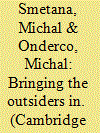

|
|
|
|
|
| Summary/Abstract |
In this article, we draw on insights from the interactionist perspective in sociology and international relations (IR) norm contestation literature to explore the relationship between deviance and normative change in international politics. In IR, this is still largely unexplored territory: we already know a great deal about how norms change, yet we know much less about the actual role norm violations play in this process. In order to address this gap, we conceptualize three types of normative contestation and affirmation that take place in connection with deviance (re)construction: (1) applicatory contestation and affirmation, reconstructing the meanings of international norms; (2) justificatory contestation and affirmation, challenging and reaffirming the legitimacy of international norms; and (3) hierarchical contestation and affirmation, contesting and reaffirming the relative value and importance of international norms. We discuss how, as a consequence of these dynamics, deviance-making produces both stability and change in the normative structure of world politics.
|
|
|
|
|
|
|
|
|
|
|
|
|
|
|
|
| 4 |
ID:
179277
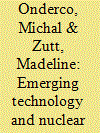

|
|
|
|
|
| Summary/Abstract |
What is the impact of emerging technologies on nuclear security and disarmament? Current rapid technological advances are taking place against the backdrop of increased investments in modernizing nuclear arsenals, rising tensions among great powers, and increased pressure on nuclear arms control agreements. Yet, the anticipated net effect of these emerging technologies on the nuclear landscape remains ambiguous. Through a survey with 85 experts and a series of elite interviews with 14 decision-makers, this article contends that while emerging technologies destabilize nuclear deterrence by increasing nuclear risk, they can also create fresh opportunities for nuclear disarmament. Given that new technologies are changing the nature of nuclear threats, this article also argues that we need to change the way we think about arms control if we want to respond effectively to the threats posed by emerging technologies.
|
|
|
|
|
|
|
|
|
|
|
|
|
|
|
|
| 5 |
ID:
190069
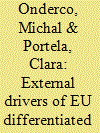

|
|
|
|
|
| Summary/Abstract |
Since its establishment, the Common Foreign and Security Policy (CFSP) has strived to increase convergence among EU member states. Yet, convergence remains elusive and scholars have started to explain the emergence of differentiated cooperation resulting from multiple internal EU crises. We posit that the convergence in the EU member states with respect to nuclear weapons has been fundamentally altered by the humanitarian turn to nuclear disarmament. This has led to a crystallization of differentiated subgroups among the member states, whose membership coincides with that of informal groupings active in the broader nuclear nonproliferation regime. Combining quantitative data on resolution sponsorship at the Non-Proliferation Treaty review process and voting at the UN General Assembly, we show that significant change in the international nuclear nonproliferation regime led to differentiated cooperation within the CFSP, resulting in two cohesive subgroups of member states.
|
|
|
|
|
|
|
|
|
|
|
|
|
|
|
|
| 6 |
ID:
189005
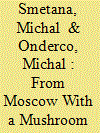

|
|
|
|
|
| Summary/Abstract |
This article presents findings of an original survey experiment on public attitudes toward nuclear use conducted on a representative sample of Russian citizens. We randomly assigned our participants to experimental treatments with vignettes describing a military conflict between Russia and NATO in the Baltics, where Moscow considered a limited nuclear “escalate-to-deescalate” strike to avert defeat. Our findings show that Russians are significantly more averse to nuclear strikes than to the corresponding use of conventional missiles. The participants disapproved similarly of a demonstrative nuclear explosion in an unpopulated area and of nuclear strikes in a more escalated scenario. We also found associations between the moral values of individuals and strike support corresponding to earlier studies in the United States. Finally, our participants reported similar concerns about both nuclear and conventional strikes, with the worry about civilian casualties and the suffering of victims at the top of the list across experimental treatments.
|
|
|
|
|
|
|
|
|
|
|
|
|
|
|
|
| 7 |
ID:
181642
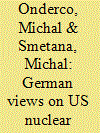

|
|
|
|
|
| Summary/Abstract |
Stationing of US nuclear weapons in Europe is a pillar of NATO deterrence. Despite their growing contestation, scholarly research on contemporary attitudes of both voters and political elites to the continued stationing of these weapons on their soil is lacking. We conducted original surveys of 2020 Germans and of 101 Bundestag members. Our results show scepticism about the military utility of US nuclear weapons in Germany, and aversion towards their use. At the same time, the results show a sizable support among both politicians and citizens for their removal from German territory as part of new nuclear arms control initiatives.
|
|
|
|
|
|
|
|
|
|
|
|
|
|
|
|
| 8 |
ID:
137047
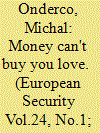

|
|
|
|
|
| Summary/Abstract |
The controversy of the Iranian nuclear programme divided the European Union (EU) member states. Whereas some states preferred confrontation, others were in favour of the accommodation. Policy commentators frequently ascribed this difference to diverging economic interests of Europeans, but this link remained underexplored. In this article, the empirical link between the economic interests and positions towards Iran is explored. The analysis rests on the evaluation of both overall and strategic trade flows. The results suggest that while trade played a certain role in the shaping of the policies, the effect of the strength of the alliance with the USA explains a large part of the puzzle. The article thus casts shadow on the established policy narrative of economic interests being the driver of the EU members' Iran policy. In addition, the theoretical implications cast shadow over the applicability of commercial liberalism on instances of confrontation short of war.
|
|
|
|
|
|
|
|
|
|
|
|
|
|
|
|
| 9 |
ID:
114432
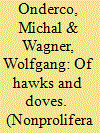

|
|
|
|
|
| Publication |
2012.
|
| Summary/Abstract |
The policies toward countries aspiring to acquire nuclear weapons continue to be heavily contested, differing even among countries that consider nuclear proliferation as one of the main threats to international security. This article maps the actual policies of liberal democracies toward Iran and North Korea along a continuum from confrontation to accommodation. Using data from an expert survey, the authors outline four main findings. First, policies toward both Iran and North Korea have become increasingly confrontational over time. Second, no policy convergence was observed among the states studied; that is, notwithstanding the adoption of joint sanctions, differences remained between states preferring confrontation and those opting for accommodation. Third, states maintained remarkably stable policy profiles over time. Finally, despite obvious differences between the norm violations of North Korea and Iran, states generally followed remarkably similar policies toward both countries. The authors' findings indicate that states exhibit stable preferences for either confrontation or accommodation toward nuclear aspirants. Although a comprehensive examination of the causes of these policy differences is beyond the scope of this article, the authors present evidence that a major cleavage exists between members and non-members of the Non-Aligned Movement, indicating that the degree to which nuclear aspirants' sovereignty should be respected is a main issue of contention.
|
|
|
|
|
|
|
|
|
|
|
|
|
|
|
|
| 10 |
ID:
160813
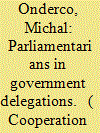

|
|
|
|
|
| Summary/Abstract |
Why do governments include parliamentarians in the delegations to international negotiations? Conduct of the diplomatic negotiations is among the most tightly controlled prerogatives of the executive, and executives have been historically dominant in the conduct of foreign policy. This article draws on the participation of members of parliaments in national delegations to the Review Conferences of the Non-Proliferation Treaty over the past 40 years. The emerging patterns show that legitimation through oversight is unlikely to be the reason for participation. Drawing on literature on institutional variation in legislative–executive relations, the data indicate that executives are more interested in co-opting the parliamentarians, in order to make them less opposed to the government’s policy.
|
|
|
|
|
|
|
|
|
|
|
|
|
|
|
|
| 11 |
ID:
168442
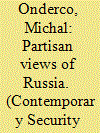

|
|
|
|
|
| Summary/Abstract |
The connection between Russia and European political parties has been in the scholarly and popular spotlight recently. While scholars focus on the connection between the far right (and populist) parties and Russia, they have all but ignored the rapidly increasing literature on the role of political parties in foreign policy. This article provides an attempt to bridge these literatures. After analyzing a corpus of party manifestos, the results suggest that there is temporal variation in how European parties have seen Russia since the end of the Cold War. European parties tended to be mostly positive in their views of Russia prior to 2015. Geography and ideology were much less important as a factor in explaining party positions. While some ideological groups share attitudes across different borders, the overall influence of ideology on attitudes toward Russia is minimal.
|
|
|
|
|
|
|
|
|
|
|
|
|
|
|
|
| 12 |
ID:
168487
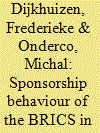

|
|
|
|
|
| Summary/Abstract |
The formation of informal groupings of states is a manifestation of the global shift in economic power. One such a grouping is the BRICS, consisting of Brazil, Russia, India, China and South Africa, which stands out for its importance due to its economic weight, its coverage across continents and the numerous internal differences. The BRICS have collectively flexed their muscle and expressed their intentions to extend their cooperation at the United Nations (UN). Proposals in the United Nations General Assembly (UN GA) take the form of resolutions, which can be written and co-written by the UN member states. This so-called sponsoring of resolutions is a way to push agenda items forward. Using a large-N network analysis, we examine the patterns of co-sponsorship of the BRICS of resolutions adopted in the UN GA plenary sessions. We find that the BRICS cooperate on fields such as economic issues, however, they do not form a coherent bloc when it comes to resolution sponsorship. These results raise the question in what way the BRICS actually cooperate at the UN level.
|
|
|
|
|
|
|
|
|
|
|
|
|
|
|
|
| 13 |
ID:
178502
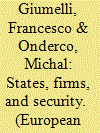

|
|
|
|
|
| Summary/Abstract |
While the current practice of the United Nations Security Council, the European Union, and the United States leans towards imposing only targeted sanctions in most of the cases, private actors often complain about inability to process financial transactions, ship goods, or deliver services in countries where sanctions targets are located. The impact of sanctions often ends up being widespread and indiscriminate because sanctions are implemented by for-profit actors. This article investigates how for-profit actors relate to the imposition of sanctions, how they reflect them in their decisions, and how they interact with the public authorities. The findings of our research show that for-profit actors, with the possible exception of the largest multinationals, do not engage with public authorities before the imposition of sanctions. The behaviour of for-profit actors in the implementation phase is in line with the assumption of firms and business as profit-maximisers. Weighting the profits from business against the costs of (non-)compliance and make the decisions that in their view maximise their profit. Indeed, de-risking seems to be the most common approach by the companies due to the uncertainties produced by the multiple and overlapping sanctions regimes imposed by the United Nations, the European Union, and the United States.
|
|
|
|
|
|
|
|
|
|
|
|
|
|
|
|
| 14 |
ID:
187495
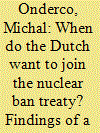

|
|
|
|
|
| Summary/Abstract |
Even if most European countries have not yet joined the Treaty on the Prohibition of Nuclear Weapons (TPNW), the treaty has been salient in a number of national settings. In the Netherlands, the TPNW enjoys broad societal appeal, and the Dutch parliament has, on a number of occasions, called on the government to explore options for joining the treaty. In this piece, we empirically study Dutch attitudes toward joining the TPNW. Our findings indicate that a majority of the Dutch would prefer to accede to the TPNW only if nuclear-weapon states or other NATO allies also joined, although unilateral accession received relatively strong support among the youngest respondents, women, and voters supporting the left-wing parties. The most popular option is to join the TPNW at the same time that the nuclear-weapon states do, which seems to be a rather distant prospect in the current international-security environment.
|
|
|
|
|
|
|
|
|
|
|
|
|
|
|
|
| 15 |
ID:
145193
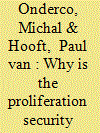

|
|
|
|
|
| Summary/Abstract |
Informal institutions such as the Proliferation Security Initiative (PSI) have increasingly been at the forefront of global efforts to counter proliferation of weapons of mass destruction. Yet a number of countries with strong non-proliferation credentials and incentives to stop likely proliferators have hesitated to join it. We use insights from alliance theory to explain this counterintuitive situation, and frame the decisions of states that are considering joining the PSI as maximizing between security, autonomy, and influence. We argue that while the PSI and similar institutions are comparatively flexible and less rigid in nature, they also exert a lesser constraint on the more powerful states than do international organizations (IO) which reduce uncertainty by freezing the existing hierarchies in place. We then look at a collection of states that vary in their positions on American hegemony, and find that security interests are predominantly decisive among hegemonic and supporter states and nuclear capable states, which are in favour of supporting the PSI, while counter-hegemonic motivations are largely decisive among states that reject the PSI. Consequently, the perceived lack of legitimacy of informal frameworks by states that are sceptical of US hegemony not only undermines the long-term effectiveness of such frameworks, but also reinforces scepticism of US hegemony. The desirability of increasing informalization of security arrangements should therefore be reappraised in the light of systemic stability.
|
|
|
|
|
|
|
|
|
|
|
|
|
|
|
|
|
|
|
|
|